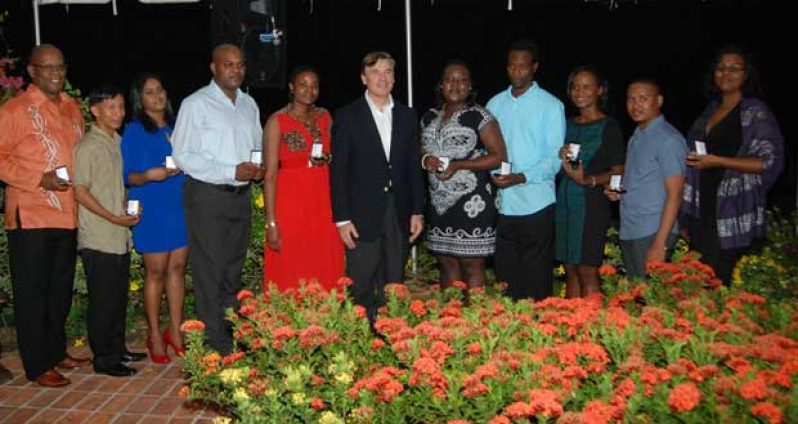US Embassy honours 10 local journalists
THE world marked the observance of World Press Freedom Day on Saturday and at a reception Friday evening, the United States Embassy recognised the efforts of 10 journalists as well as editors of local media houses.
United States Ambassador to Guyana, Brent Hardt, in his remarks at the event, noted that the job of journalists is a tough one.
He said, “The fact is you all have a tough job; you have to try to pry information from people who may not want the information out, or you have to sift through information put forward quite eagerly, but whose primary purpose may be to distract or divert your focus. And at the end of the day, you have to tell a story; a rough draft of history that people will find interesting and worthwhile to read.”
Noting that journalism, despite its many challenges, can also be rewarding, Hardt said:
“In Guyana’s newspapers and television this past year, we have seen many examples of journalists who have brought to public attention stories that needed to be told; stories of young girls enduring the slavery of trafficking in persons in remote mining areas, and being rescued by courageous Guyanese women, only to find inadequate support and law enforcement follow-through after their rescue; or stories of Guyanese members of the LGBT community facing violent assaults or other forms of discrimination; or stories that make comprehensible to people complex issues of money laundering or budget debates; or stories that highlight the decay in local communities in urgent need of effective, elected local governance.
“That Guyana’s media is able to report on these and many other stories is why ‘Reporters Without Borders’ ranked Guyana a respectable 67th worldwide out of 180 countries in its 2014 Press Freedom Index, a slight improvement from last year.”
PREPARATION and PERSISTENCE
On that note, Hardt charged journalists to follow the principles of preparation and persistence.“Be prepared,” he said. “Always be reading, listening, and watching. See what other media sources are saying, writing, and thinking. Be critical in your appraisal. Notice and analyze what makes a story or feature compelling to read. You need to keep knocking – politely – on dozens and dozens of doors until the right door opens.”
TRAINING
The US Ambassador also underscored the importance of training, relative to media standards and stressed the embassy’s commitment to supporting local journalists in this regard.
He said, “For the media to play its vital role in a democracy, it must be well trained and hold itself to the highest professional standards. Press freedom is not just an abstract policy, but a very practical skill that needs to be taught, nurtured and promoted. The Embassy has been pleased over many years to be able to contribute to media training in Guyana, and we welcome the support we have received from editors and the enthusiastic participation of reporters.
Recently, Managing Director of Demerara Waves, Dennis Chabrol participated in the State Department’s prestigious International Visitor Leadership Programme, joining the likes of Speaker of the House Raphael Trotman, Minister Robert Persaud, Alliance for Change (AFC) Leader Khemraj Ramjattan, Justice Roxanne George, and Gordon Moseley as IVLP alumni. His programme focused on new media and social networking tools and how new media can be used to promote transparency and accountability.
Additionally, Hardt announced the Embassy’s plan to host media workshops on May 16 and 17 for entry level reporters and communications students.
“These workshops will address challenges in journalism, women in media, journalistic integrity, and sustainability of journalism. We will pick up where we left off from last year’s media training, which was done in conjunction with the Centre for Communication Studies at the University of Guyana,” he said.
The US Ambassador noted that there are positive signs for Guyana’s development, in terms of press freedom, but there is more that can be done to protect and expand freedom of the press and the free exchange of ideas and perspectives it makes possible.
World Press Freedom Day is observed annually on 3rd May to remind countries and people all around the world, that freedom of the press and freedom of speech and expression are fundamental human rights. This day is often held to remember many journalists who have died or faced jail in order to bring news to the public.
The World Press Freedom Day was established by the General Assembly of the United Nations in December 1993 as an outgrowth of the ‘Windhoek Declaration’ adopted in 1991 in Namibia for promoting independent and pluralistic African Press.
The World Press Freedom Day is celebrated on 3rd May, the date on which the Windhoek Declaration was adopted, which emphasized the need of a free press for developing and maintaining democracy and for economic development.
Article 19 of the 1948 Universal Declaration on Human Rights (considered as an important stepping stone to the freedom of press) states that everyone “has the right to freedom of opinion and expression, this right includes freedom to hold opinions without interference and to see, receive and impart information and ideas through any media and regardless of frontiers.”
According to ‘Reporters Without Borders’, more than a third of the world’s population live in countries where there is no press freedom or where there is no system of democracy or where there are serious deficiencies in the democratic process.
This year, the day was marked under the theme, ‘Media Freedom for a Better Future’.
(By Vanessa Narine)



.jpg)








